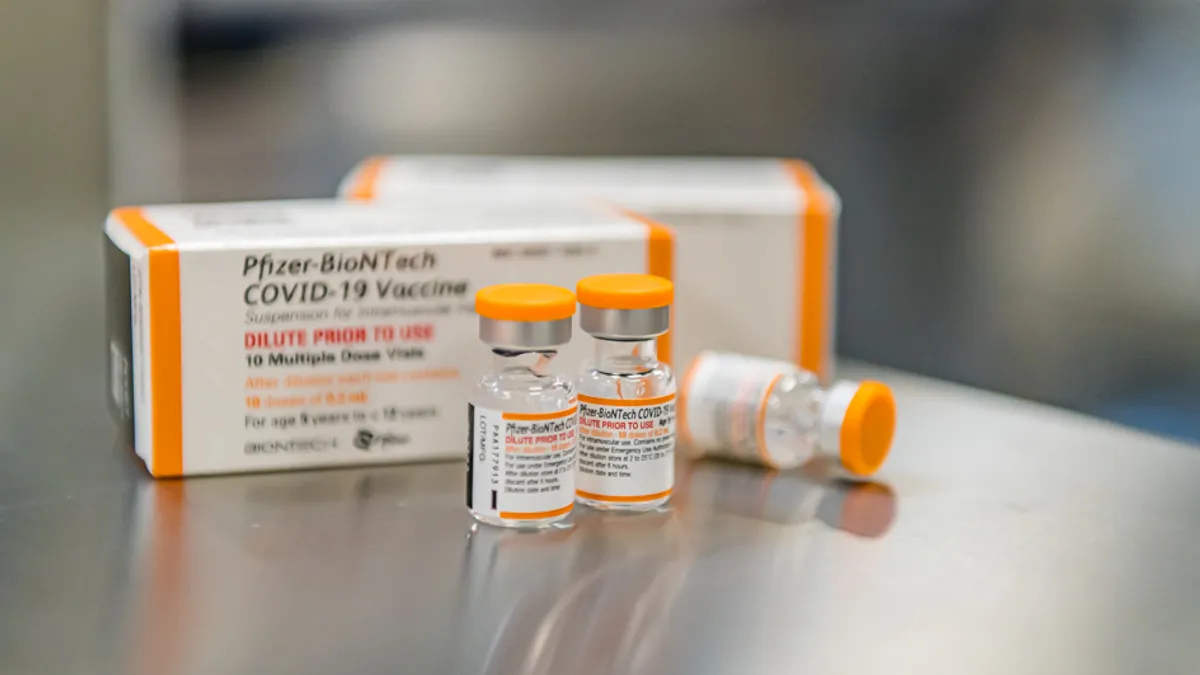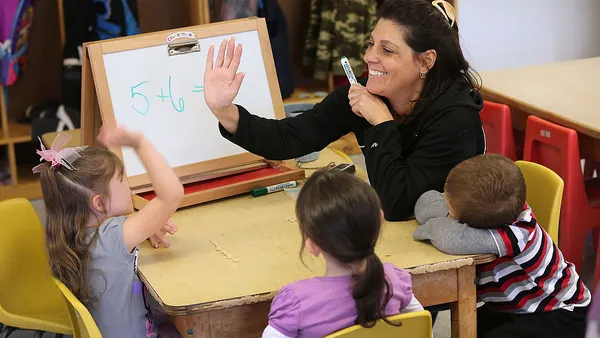Dive Brief:
- Three doses of Pfizer and BioNTech's COVID-19 vaccine met the Food and Drug Administration's bar for success in a trial studying the shot in children younger than 5 years old, the companies said Monday. The FDA has tentatively scheduled a meeting of outside advisers to review the data in three weeks.
- The agency delayed review of the vaccine in the youngest children earlier this year after a December review of data indicated a two-shot series didn't spur an immune response that was likely to protect against disease. When Pfizer and BioNTech disclosed that data, they announced plans to test immune response and efficacy after three shots.
- The announcement comes days after U.S. officials warned of a new surge of COVID-19 cases as mask mandates have been lifted and while immunity from vaccination and previous infections wanes. The FDA has granted emergency use authorization for as many as four shots of Pfizer and BioNTech's vaccine — an initial two-dose series followed by two periodic boosters — for adults at least 50 years old.
Dive Insight:
While much of the U.S. population has some protection from COVID-19, vaccine developers have left testing their shots in the youngest children to last, complicating life for families trying to resume close-to-normal life activities. Early stumbles from Pfizer and BioNTech, meanwhile, delayed progress further.
Pfizer and BioNTech are seeking authorization of a pediatric vaccine for children aged 6 months through 4 years through a method known as "immuno-bridging." In this case, the companies assessed whether vaccination stimulated similar levels of antibodies as was seen with the adult dose in people aged 16- to 25-years old. Three doses of the lower dose in the youngest kids was found to be similar to two shots in older teenagers and young adults.
An early analysis of efficacy data indicated the three-dose regimen was 80% effective in preventing symptomatic COVID-19, the companies said. However, that was based on 10 cases through April 29 — out of a total of 1,678 children in the study — and Pfizer characterized the analysis as "descriptive." A formal statistical analysis will take place after 21 cases occur.
The companies said the vaccination regimen was "similar to placebo," and that most side effects were mild or moderate.
The companies will submit the safety and immuno-bridging data to the FDA by the end of this week and to the European Medicines Agency and other global regulators "in coming weeks."
The FDA has tentatively scheduled a meeting for June 15 to review Pfizer and BioNTech's data in children, along with that of a pediatric COVID-19 shot from Moderna the day before. The latter company in late April asked for an emergency use authorization of a two-dose series of its pediatric shot for children aged 6 months through 5 years old.
While the data is good news, some Wall Street analysts cautioned that demand might not be as high for the pediatric vaccine as children tend to have milder disease, and fewer people are getting sick now than during the peak of the omicron wave.
Umer Raffat, an analyst at Evercore ISI, cautioned against drawing too many conclusions from the efficacy data disclosed so far because of the small number of cases. Raffat also questioned why Pfizer was still using a version of the vaccine directed at the original coronavirus strain.
"Should we really be giving the old vaccine [at] 3 doses to kids instead of an omicron-specific regimen instead?" he wrote in a May 23 note to clients.







 Dive Awards
Dive Awards





